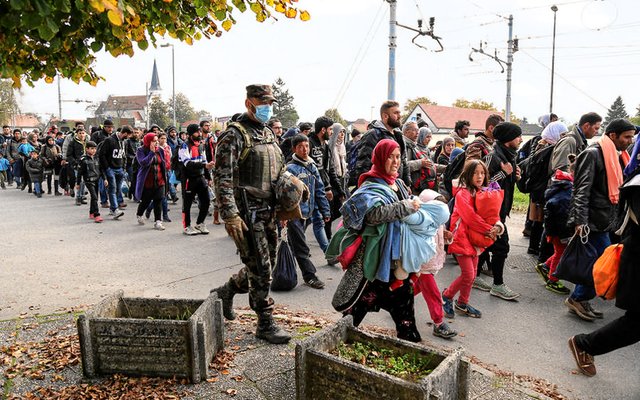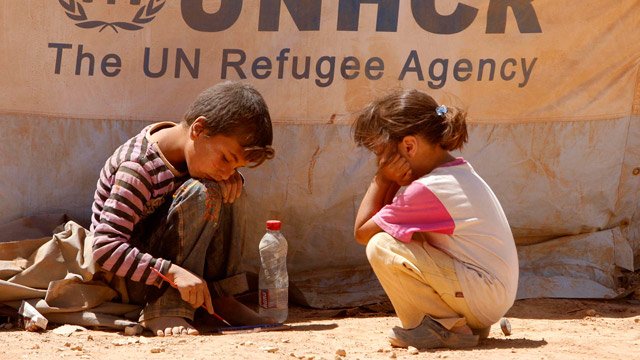Should America Accept Syrian Refugees? The Arguments for and Against.

Right now, over 13 million people in Syria need humanitarian assistance due to a violent civil war. Since the crisis began in 2011, Syria’s civil war has quickly become the worst humanitarian crisis of our time. Half of the country's pre-war population has been killed or forced to flee their homes.
Roughly 5 million Syrians have registered or are awaiting registration with the United Nations High Commissioner for Refugees, and Obama announced in April that he expects to admit 10,000 refugees this year.
The United States is a country that is built on refugees and immigration. Even the founders of America could be classified as refugees.
Arguing for.
If you actually look at the statistics of who we're taking about, it makes sense as to why this isn't a threat to our national security. More than half of the Syrian refugees we've brought into the U.S. so far have been women and children. A State Department spokesman says that so-called “military-age males” unattached to families make up just two percent of Syrian refugees admitted to date to the U.S.
It could take years for refugees to even enter the Untied States.
The screening process for Syrian refugees includes many interviews, background checks and an extremely extensive cross-referencing process.
First, they have to go through a two-year screening process by the United Nations High Commissioner for Refugees. If accepted (less than 1% are, by the way), they'll have to go through a further rigorous process. First, they need clearance from the State Department, then security screenings with the National Counterterrorism Center begin, then with the FBI, and then with the Department of Homeland Security. And because they're from Syria, they'll also need to go through an additional set of screening called the Syrian Enhanced Review a few interviews with the NSA. Once all that is completed, then they have to go through health checks while other information is still being run against terrorist databases to make sure there are no possible links to terrorist networks. That process takes another two years, so in all Syrian refugees could have to go through four years of different screening and vetting processes before they're allowed to resettle.
As Lavinia Limon, the chief executive officer of USCRI points out, It seems to me that terror networks are better funded than to keep someone in a refugee camp for four years to hope that they’ll be the half of one percent that will get to come in,” she said. “That’s not very efficient!”
From a terrorist network standpoint, it doesn't make such financial sense for them to wait four years on the off-chance that one of them might end up in the United States.
If they're going to come into this country and commit a terrorist act, it's much more likely that they're going to do so through a Visa just like Tashfeen Malik of the 2015 San Bernardino shootings did. Doing it through the refugee system just doesn't make much sense at all.
Since 9/11, we have taken in over 784,000 refugees, and only three of those were later convicted for terrorist-related activity. Two weren't even planned on US soil, and the other wasn't considered a viable threat.
Deputy State Department Spokesman Mark Toner called the security checks for refugees “the most stringent security process for anyone entering the United States.”
Arguing against.
There is inherent security risk involved with taking in Syrian refugees. Of the 66 U.S. citizens that have been arrested due to connections with ISIS, some of them were in-fact Middle Eastern refugees. In the recent Paris terrorist attacks, one of the people that was involved was a Middle Eastern refugee as well. The FBI director himself has admitted that it would be nearly impossible to accurately vet all 10,000 of the Syrian refugees coming in, and ISIS itself has promised to use the refugee system to funnel in some of its members to the United States.
The San Bernardino shooter used a fake address in her visa application, so we know that the screening process isn't as strong as we'd like to be. Even the attackers' family had no idea that their son was capable of doing something of this magnitude — they didn't even know he was sympathetic with ISIS. If this man's own family had no idea that he was involved in terrorist activity, how is it possible that the FBI is going to have any idea what these 10,000 are capable of through their broken screening and vetting processes?
Looking beyond the inherent security risk, we also have to see if it's rational for America as a country. To take in 10,000 Syrian refugees would cost $600 million. Wouldn't that money be better off used to help the 200,000 homeless people in this country that are under the age of 18?
We also need to ask ourselves: are we really doing the Syrian refugees a favour by putting them into the United States? It's well documented that Middle Eastern refugees have a much harder time affiliating to life within the U.S. 62% of Middle Eastern refugees end up on Medicaid compared to 51% of illegal immigrants and 32% of natives. 32% of Middle Eastern refugees end up on Supplemental Security Income, compared to only 10% of legal immigrants and 7% of natives.
Put it this way: if you have a family out of Los Angeles that is really struggling to make ends-meat, do you move them to Seattle or do you move them to South Korea? A lot of these Middle Eastern refugees would be much better off in areas and cultures that are much like their own. Maybe we should be putting them in stable countries within their own region rather than a country which they're going to have a much harder time acclimating to, and are going to have a much harder time integrating themselves within its culture.
Is it worth $600 million to take in these Syrian refugees with the inherent security risk involved? They may not be bad people, but it's much more likely that at least one of the 10,000 are going to be terrorists compared to one of 10,000 Scottish immigrants, for example.
Even in France, 27% of people between the ages of 18 to 24 sympathize with ISIS. There's many more ISIS supporters than what we realise. People don't need to be integrated into terrorist networks in order to carry about attacks in their name. All they have to do is sympathize with ISIS, and they can carry out an attack out on their own. Thats very hard to screen or vet for.
The vast majority of terrorism-related radical violence in the U.S. is coming from "lone wolves" rather than abroad groups. According to a study by the Southern Poverty Law Center, fully 74% of the more than 60 incidents examined were carried out, or planned, by a lone wolf, a single person operating entirely alone.

Which side of the debate are you on?
I know it's a very contentious issue within America right now, but it's an important one. The opinions and facts I've stated may not be absolutes, so please let me know if you can expand on anything or even correct me. I've made this post to create an open dialog on the issue itself and to hear what other people think.
Let us know your thoughts.
we labelled ourselves as countries but before that planet earth used to be one country. i think cryptocurrency and blockchain united us again.
Crypto to the rescue?
How do you plan to leverage blockchain technology to aid refugees in war-torn countries?
Hi! This post has a Flesch-Kincaid grade level of 14.2 and reading ease of 35%. This puts the writing level on par with academic journals.
is that good
Very thourough post. Im not sure if i am on any particular side. There is without a doubt risk involved in allowing these refugees into the US. The problem is that it only takes one bad guy to get through, and who knows what could happen. But these people need our help. I try to always have faith in people, not always easy, but i think almosy all people are good. So i guess i am saying that it is worth the potential risk, to show the world that we are not afraid. That we are here to help people despite the risk. Everyone worries what are the bad things that could happen. What about the good things that may not happen if we dont allow them. What about the lives that could change and be touched through our welcoming of these peoples. What good could they do for us, and us for them?
Terrific post, thank you! I too am conflicted on the issue.
Yes, yes. The USA was built on the foundation of immigrants. That core value of what makes America America must never be forgotten.
There's a security risk, yes, but closing borders is not the solution. The terrorists will find there way in, no matter what, and instead you are denying millions of potentially good citizens an opportunity. Isn't that what the USA is - the land of opportunity?
Not to mention, gun violence from American citizens leads to thousands of times greater deaths than any terrorist attack.
So, it's up to the security agencies in USA to step up, screen the immigrants thoroughly. Make sure terrorists are neutralised.
But millions of good, hardworking people must not be denied.
I don't think it's fair to compare what is mostly gang-banger turf disputes to indiscriminate mass-killings of the general population in the name of Allah -- including women and children.
Similarly, it's not fair to equate the actions of a handful of misguided terrorists justifying their actions in the name of Allah to those of 1.8 billion peaceful people who pray to Allah around the world. The moment you start thinking along these lines, it only means the terrorists have won.
Hold up. Could you please point out where I equated Islamic terrorists to the global muslim population?